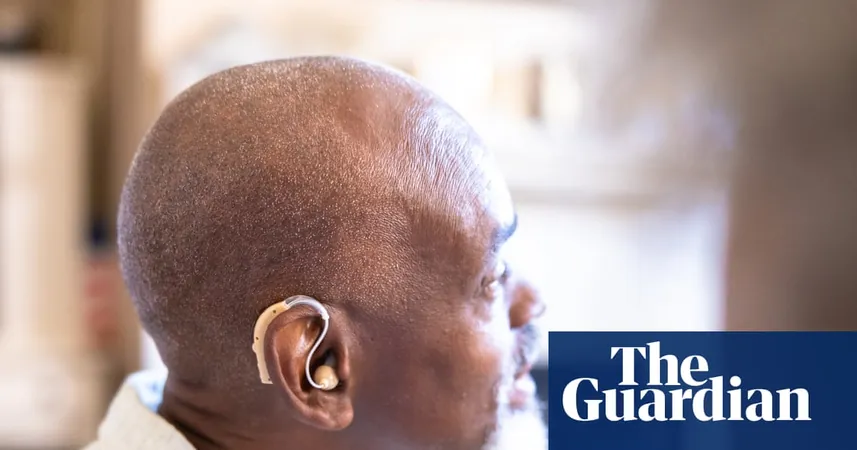
Your Hearing and Your Brain: The Alarmingly Close Connection You Need to Know
2025-07-30
Author: Ting
The Surprising Link Between Hearing Loss and Dementia
A groundbreaking study has revealed a concerning connection between hearing loss and the risk of dementia. While the relationship is still being explored, experts like audiologist Nicholas Reed from NYU Langone Health strongly urge that prioritizing hearing health is crucial for overall brain function.
Understanding Hearing Loss: It’s More Than Just Volume
Hearing loss can arise due to a multitude of factors, from genetics to environmental influences like chronic diseases and smoking. Age-related hearing loss, known as presbycusis, affects many seniors. Reed clarifies that hearing loss isn’t solely about low volume; it’s primarily a clarity issue—sounds can become muddled, making communication difficult.
The Dementia Connection: Could Treating Hearing Loss Delay Cognitive Decline?
Preliminary research suggests that untreated hearing loss may be linked to faster cognitive decline and a heightened risk of developing dementia. Although causation has yet to be established, Reed’s research found that 32% of dementia cases in a sample of nearly 3,000 older adults could potentially be attributed to hearing loss.
Social Isolation: A Hidden Danger?
As hearing deteriorates, social isolation often follows, which can exacerbate cognitive decline. Without adequate auditory stimulation, brain functions may weaken, leading to problems with memory. The Lancet's influential 2020 report even recommended hearing aids and noise protection as key measures for reducing dementia risk.
Preventing Hearing Loss: Take Control of Your Ear Health!
Hearing loss isn't inevitable, and several preventive measures can help maintain your hearing. Managing health conditions such as diabetes and high blood pressure, coupled with minimizing exposure to loud environments, can go a long way. Simple actions, such as wearing earmuffs at concerts, can make a significant difference.
Regular Hearing Tests: Your Early Defense Against Decline
Experts recommend that individuals begin hearing assessments in their late 30s or 40s to catch any changes early on. Establishing a hearing baseline will help you recognize changes and address them before they become more challenging.
Can Hearing Loss Be Reversed?
While some treatments like hearing aids can greatly improve hearing, their effectiveness varies from person to person. It's crucial to consult with a healthcare provider if you suspect hearing issues—early interventions can significantly enhance quality of life.
Revolutionary Assistive Technologies for Better Hearing
Highly innovative assistive technologies are making waves in the realm of hearing aid solutions. Devices that amplify sound and prioritize speech, like the Apple AirPods Pro 2, can greatly improve communication for those with mild to moderate hearing loss. Furthermore, supportive strategies within communities can enhance the effectiveness of these technologies.
The Importance of Staying Social and Engaged
Engagement with friends and family is essential for maintaining cognitive health. Research suggests that individuals with hearing aids experience lower levels of loneliness and foster more enriching social connections. Reed advocates for facilitating good communication practices—such as making eye contact, speaking slowly, and rephrasing statements—as simple yet effective strategies.
Your Hearing Health Matters—Act Now!
Your hearing health is intrinsically linked to your cognitive well-being. Taking proactive steps to protect and enhance your hearing can lead to better quality of life as you age. Don’t let hearing loss go neglected; stay engaged, stay informed, and take action!


 Brasil (PT)
Brasil (PT)
 Canada (EN)
Canada (EN)
 Chile (ES)
Chile (ES)
 Česko (CS)
Česko (CS)
 대한민국 (KO)
대한민국 (KO)
 España (ES)
España (ES)
 France (FR)
France (FR)
 Hong Kong (EN)
Hong Kong (EN)
 Italia (IT)
Italia (IT)
 日本 (JA)
日本 (JA)
 Magyarország (HU)
Magyarország (HU)
 Norge (NO)
Norge (NO)
 Polska (PL)
Polska (PL)
 Schweiz (DE)
Schweiz (DE)
 Singapore (EN)
Singapore (EN)
 Sverige (SV)
Sverige (SV)
 Suomi (FI)
Suomi (FI)
 Türkiye (TR)
Türkiye (TR)
 الإمارات العربية المتحدة (AR)
الإمارات العربية المتحدة (AR)